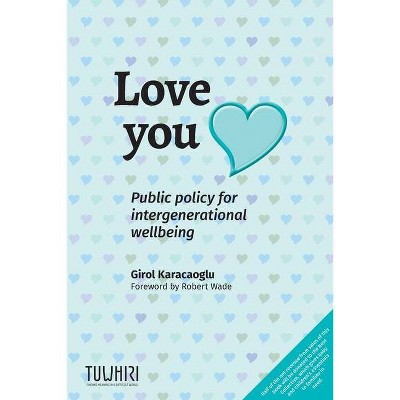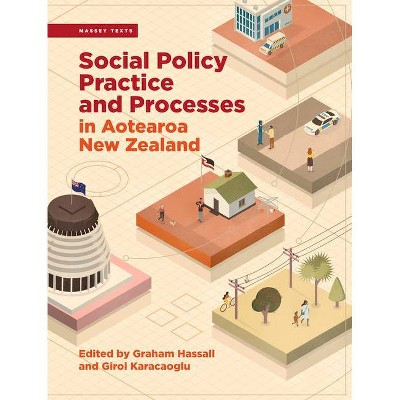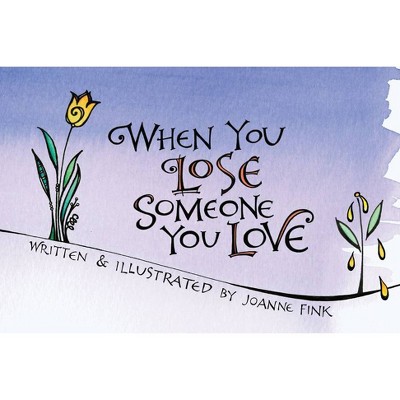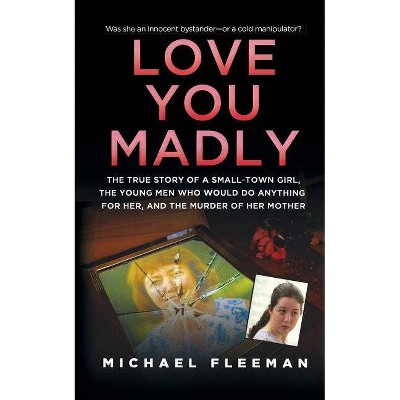Love you - by Girol Karacaoglu (Paperback)

Similar Products
Products of same category from the store
AllProduct info
<p/><br></br><p><b> About the Book </b></p></br></br>This book examines the processes by which wellbeing-focused public policy objectives are established, prioritised, funded, implemented, managed, and evaluated, while ensuring that they remain relevant as social preferences change over time.<p/><br></br><p><b> Book Synopsis </b></p></br></br><p>How would we design, implement and evaluate public policy if it were based on our love for future generations? For the philosopher Walter Kaufman, 'I love you' means: </p><p><br></p><p>'I want you to live the life that you want to live. I will be as happy as you if you do; and as unhappy as you if you don't.'</p><p><br></p><p>We have no idea what future generations will value and how they will want to live. Nor do we wish to prescribe how they choose to live, so long as they do not prevent others from living the lives they value.</p><p><br></p><p>We want to prepare and look after the 'wellbeing garden' - the broader ecosystems - that will provide them with the opportunities and capacity to survive and thrive, to flourish in safety. As another philosopher, Walter Benjamin, put it, 'We want to liberate the future from its deformation in the present.'</p><p><br></p><p>Wellbeing is about the ability of individuals and communities to live the lives they value - now and in the future. This is their human right. It would be unjust to prevent the enjoyment of lives centred on chosen values. Preventing such injustice across generations should be the primary focus of a public policy that has intergenerational wellbeing as its objective.</p><p><br></p><p>This book examines the processes by which wellbeing-focused public policy objectives are established, prioritised, funded, implemented, managed, and evaluated, while ensuring that they remain relevant as social preferences change over time.<p/><br></br><p><b> Review Quotes </b></p></br></br><br><p>This is a book we need - now. Weaving international research, philosophic thought, and leadership experience spanning public and private sectors, and grounded with a strong sense of being a 'human' citizen, Girol Karacaoglu beautifully reveals the limitations of our current government and public service settings and reconnects us to our simple shared human story. He uses this simplicity and clarity to throw light on our complex challenges and helps illuminate the direction we need to head. A must read for anyone wanting to be of service to the public and enhance our collective wellbeing.</p><p>- <strong>David Hanna</strong>, CLD Influencing and Practice Lead, Inspiring Communities</p><p><br></p><p>A great contribution to the growing wellbeing and public policy field and one that is properly holistic. This serious consideration of intergenerational impacts of policy making and practical ways of making really difficult prioritisation decisions in the contested space of public policy moves the field forward in a robust and relevant way. Rich and highly relevant to the challenges we are facing.</p><p>- <strong>Nancy Hey</strong>, Executive Director, What Works Wellbeing</p><p><br></p><p>Girol Karacaoglu ... elaborates the moral frame that supports the expansion from growth of conventionally measured GDP as our most important objective to a multi-dimensional index of wellbeing, including income as one dimension. And he proceeds to spell out how a government, with New Zealand specifics, could make this switch.</p><p>- <strong>Robert H. Wade</strong>, Professor of global political economy, London School of Economics</p><br>
Price History
Price Archive shows prices from various stores, lets you see history and find the cheapest. There is no actual sale on the website. For all support, inquiry and suggestion messages communication@pricearchive.us




















